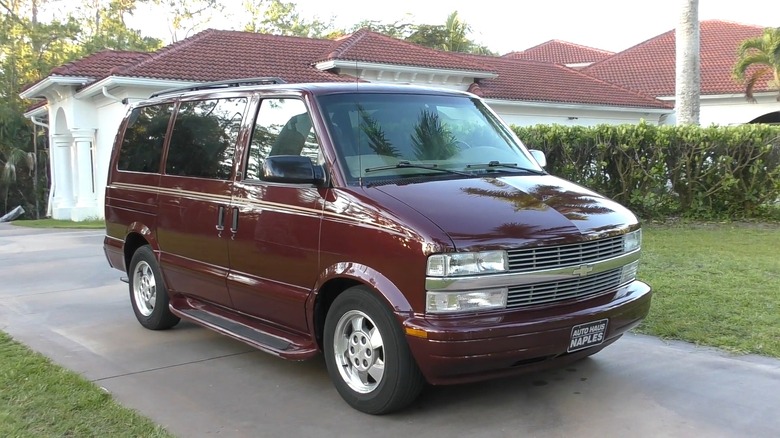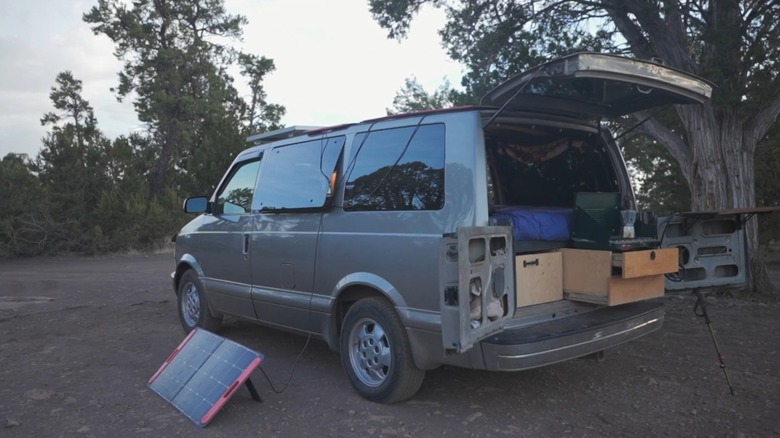What Made The Chevy Astro Van An Iconic Family Car (And Why People Still Want One Decades Later)
The Chevy Astro became a memorable family vehicle due to its expansive interior, rear Dutch door design, brawny towing capacity, and all-wheel drive capability. There was the Astro Passenger, and Astro Cargo Van, but for families it didn't matter. This was because the 90's saw a surge in van conversions, and the Astro Cargo was a perfect foundation to build in things like sleeping areas and TV's, elevating a family road trip.
While the final Astro rolled off the assembly line in 2005, there are still drivers clamoring to get their hands on a new one. With enthusiasts creating a campaign to encourage Chevy to start making them again, including a Bring Back The Astro website, which includes a video and link to a petition that has garnered over 3,000 signatures. Many fans got excited when images of a potential new model surfaced on social media, with some asking, "is Chevrolet really bringing back the Astro van in 2025?" Although the pictures didn't end up being what fans had hoped.
In the years since the van was discontinued, it has become a popular choice for overlanding, which combines off-roading, camping, and lengthy distances. The ease with which these Astro vans can be modified make them a great choice for overnighting in remote areas.
Is the Chevy Astro a minivan?
The mid-1980's was witness to the launch of the minivan, with the Plymouth Voyager becoming an instant hit in 1984. Chevrolet then answered with the Astro van a year later, offering ample interior room (enough for eight people) and decent towing capacity at 5,000 pounds. Rather than jumping onto the minivan bandwagon, Chevy held firm to billing the Astro as a "van" and a larger alternative to the Voyager.
Regardless of how the automaker promoted the Astro, it is technically a minivan. But because it shared more in common with something like Chevy's G-series vans, it was able to distance itself enough from the minivan moniker. It also helps that the Astro van's performance capabilities continued to improve, making it more akin to a truck. At one point, it featured a maximum towing capacity of 6,000 pounds, which completely outclassed any minivan of that era.
Not only are minivans not known for their towing ability, but you also don't typically see them traveling off-road either. Today you can find some highly-rated minivans that come with AWD, but back in 1990, this wasn't the case. The Astro AWD on the other hand, has many drivers recounting how capable their van was in snow, moderately flooded areas, and rough gravel roads. YouTube channel Team O'Neil even put it to the test on their video, "Chevy Astro Van: Will it Rally?" And surprisingly, the van holds its own on a snowy rally stage.
Astro vans are still driving around today
One of the other interesting points about the Astro van is that even though it hasn't been made for decades, you can still spot them on the roads. Not only were these popular with families, but the Astro Van also made an excellent work vehicle. Some owners who used their van for years housing tools and supplies for their job apparently just continued to hold onto them.
Perhaps it's their basic design or truck-like construction, but many of these vans just don't quit and you can find plenty of used models for sale today at very affordable prices. In fact, even new, the Astro Van was affordable, with its priciest 2005 model running around $26,830. This price is a stark contrast to several mini camper vans, that while well-equipped, sell for six-figures in some cases.
Car Complaints has documented very few problems with the Astro Van despite its 20-year production run. Users rated its reliability at 4.1 out of 5 on Repair Pal, noting things like inexpensive and readily available parts, and solid performance even over 200,000 miles in some cases.


